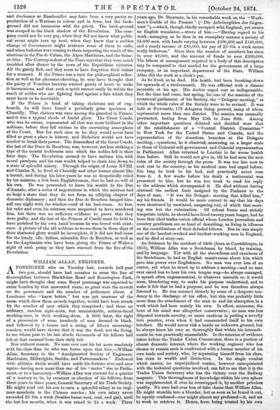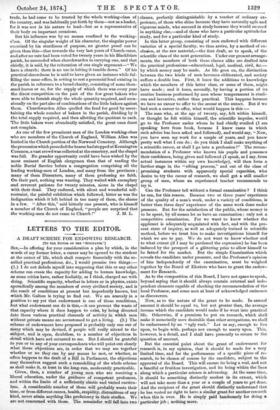WILLIAM ALLAN, ENGINEER.
AFOREIGNER who on Tuesday last, towards half-past two p.m., should have had occasion to cross the line of thoroughfare between Blackfriars Road and Kennington Park, might have thought that some Royal personage was expected to enter London by that unwonted route, so great were the crowds on the pavements and the number of policemen about. A Londoner who "knew- better," but was yet unaware of the cause which drew those crowds together, would have been struck by the number of men which they comprised ; and these no ordinary, careless sight-seers, but unmistakable, serious-faced working-men, in their working-dress. A little later, the sight of a procession of some hundreds of men dressed in black, and followed by a hearse and a string of fifteen mourning- coaches, would have shown that it was the dead, not the living, to see whom pass to his last abode thousands of his fellows had left at that unusual hour their daily toil.
Not without reason. No man ever cast his lot more resolutely with his class than he who was borne upon that bier,—William Allan, Secretary to the "Amalgamated Society of Engineers, Machinists, Millwrights, Smiths, and Patternmakers." Endowed with abilities which would have made his fortune over and over again—having seen more than one of his "mates" rise to Parlia- ment, or to a baronetcy—William Allan was content for a quarter of a century to be, by constant re-election of his fellows, from three years to three years, General Secretary of his Trade Society. He might send out his son to earn a splendid salary as an engi- neer-mandarin in the Chinese service ; his own salary never exceeded 13 10s. a week (besides house-rent, coal, and gas), until the last few months, when it was raised to 24 a week. Three years ago, Dr. Brentano, in his remarkable work on the "Work- men's Guilds of the Present " (" Die Arbeitergilden der Gegen- wart "),—which, though chiefly occupied with England, yet awaits an English translator,—wrote of him :—"Having regard to his work, managing as be does in an exemplary manner a society of 34,000 men, with funds varying between £100,000 and 1140,000, and a yearly income of 185,000, his pay of 13 10s. a week seems really ludicrous." Since then the number of members has risen to over 42,000, and the amount of funds to over 1220,000. The labour of management required in a body of this description may be compared to that needed for the government of a large company, or an important department of the State. William Allan did the work at a clerk's pay.
As he lived, so he died. His health had been breaking-down for upwards of a twelvemonth. He was afflicted with a disease incurable at his age. His doctor urged rest as indispensable. But the time had come, last spring, for one of the sessions of the occasional parliament of his Society, the "Delegate meeting," at which the whole rules of the Society were to be revised. It was held at Newcastle, 179 delegates being present, many of whom represented more than one district. The session was unusually protracted, lasting from May 25th to June 20th. Among other important questions debated and decided were that of the establishment of a "Central District Committee" in New York for the United States and Canada, and the representation of the American branches at the Delegate meeting,—questions, be it observed, answering on a larger scale to those of Colonial self-government and Colonial representation in Parliament. Allan returned to London in far worse health than before. Still he would not give in, till he had seen the new rules of the society through the press. It was too late now to seek rest in the country, as his medical man had urged before. Ere long he took to his bed, and practically never rose from it. A few weeks before his death a testimonial was presented to him, but he was too- weak to read his reply to the address which accompanied it. He died without having attained the earliest limit assigned by the Psalmist to the days of man. "It was the Delegatt meeting that killed him," say his friends. It would be more correct to say that his days werc shortened by unstinted, unsparing toil, of which that meet- ing was but the culmination. Of robust frame and strictly temperate habits, he should have lived twenty years longer, had he been that ideal trades-union official whom London journalists and country gentlemen are so fond of describing, as living in idleness on the contributions of their deluded fellows. But he Was simply one of the hardest-worked and hardest-working men in England, and he died at sixty-one.
An Irishman by the accident of birth (born at Carrickfergus, in 1813), William Allan was a Scotchman by blood, by training, and by language. Yet* with all the shrewdness and canniness of the Scotchman, he had an English massiveness about him which gave him power over Englishmen. No man was ever less of an orator, yet when he stood up to address a meeting—and no man ever cared less to hear his own tongue wag—he always managed, in speech often ungrammatical, in whatever uncouth or, it would seem, blundering way, to make his purpose understood, and to make it felt that he had a purpose, and he was therefore always listened to. He was accused latterly by some of a despotic ten- dency in the discharge of his office, but this was probably little more than the attachment of the man to and his absorption in a work which had been mainly his own. In effect, moreover, the bent of his mind was altogether conservative ; no man was less disposed towards novelty, or more cautious in putting a novelty into practice, even when it had commended itself to his own intellect. He would never risk a battle on unknown ground, but he always knew his own so thoroughly that within his intrench- meats he was practically unassailable. In the minutes of evidence taken before the Trades Union Commission, there is a portion of almost dramatic interest, where the working engineer who has chosen to remain such is confronted with a former member of his own trade and society, who, by separating himself from his class, has risen to wealth and distinction. In the single combat which ensues, no unprejudiced Teader, however unacquainted with the technical questions involved, can fail to see that it is the Trades Union Secretary who has the victory over the Railway magnate. This thoroughness of knowledge within his own sphere was supplemented, if ever he overstepped it, by another priceless quality. No man had ever less of false shame than William Allan. He might stumble into a blunder, but as soon as he found it out, he openly confessed—one might almost say professed—it, and set to work to retrieve it. Hence, from being trusted by his own trade, he had come to be trusted by the whole working-class of the country, and was habitually put forth by them—not as a leader, for it was not in his nature to lead—but as a representative of their body on important occasions.
But his influence was by no means confined to the working- Class. Of the singular weight of his character, the singular power exercised by hi a sturdiness of purpose, no greater proof can be given than this—that towards the very last years of Church-rates, and after no rate bad been voted for twenty years in his Blackfriars parish, he succeeded when churchwarden in carrying one, and that chiefly, it is said, by the reiteration of one single argument--" We have a church; there is no use in letting it tumble down." Of his practical shrewdness he is said to have given an instance while ful- Ming the same office, in setting to rest a perennial fend existing in the parish in reference to a bread charity, consisting of some thou- sandloaves or so; for the supply of which there was every year the direst competition on the part of the few great bakers who were able to furnish singly the whole quantity required, and occa- sionally on the part also of combinations of the little bakers against, them. Churchwarden Allan quelled the feud for good by ascer- taining the whole number of bakers in the parish, dividing by it the total supply required, and then allotting the quotient to each. 'The little bakers were abundantly satisfied, the great ones durst not complain.
As one of the few prominent men of the London working-class who are members of the Church of England, William Allan was buried in the Church portion of the Norwood Cemetery. Although the procession which preceded the hearse had stopped at Kenningt on Common, a vast crowd was collected at the cemetery, and the chapel was full. No grander opportunity could have been wished by the most eminent of English clergymen than that of reading the amble Burial Service before a congregation comprising all the leading working-men of London, and many from the provinces ; many of them Dissenters, many of them professing no faith. On their part, nothing was wanting. They waited with exemplary .and reverent patience for twenty minutes, alone in the chapel with their dead. They endured, with silent and wonderful self- restraint, the painful exhibition which followed, bitter as was the indignation which it left behind in too many of them, the shame in a few. "After this," said bitterly one present, who is himself a member of the Church of England, "people are surprised that the working-men do not come to Church !" J. M. L.



































 Previous page
Previous page